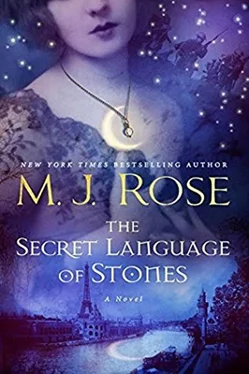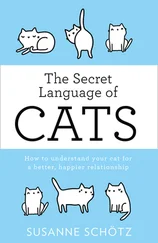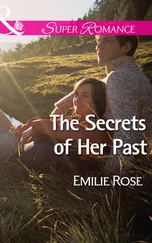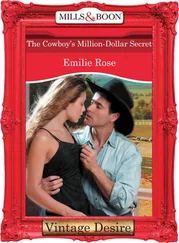I certainly hadn’t told her anything about Jean Luc in the weekly letters my parents and I exchanged. We visited several times a year when they came to Paris, either to see my mother’s dealer or when my father obtained a commission. Most recently, we’d all gone to Picasso’s wedding to his new wife, Olga, just a few weeks before. But then I hadn’t yet met Madame Alouette. Or heard from Jean Luc. And I’d never told my great-grandmother about him-so she couldn’t have written to my mother about my sad obsession.
And yet, in my hand, I held a series of paintings that not only depicted Jean Luc but also illustrated our trysts… portraying him as if he were flesh and blood in instances that had occurred-I’d felt him behind me at my worktable, and certainly making love to me in my bedroom, and I’d gone to Père-Lachaise because of his column.
Only the fountain scene hadn’t occurred.
Being well acquainted with my mother’s style, I knew it would take me days to decipher everything she’d included in the triptych, suss out the clues and their meaning. But I didn’t need time to interpret the overarching message. The triptych celebrated our love as if it were real.
I continued studying the cemetery and noticed inscriptions on the mausoleums and tombstones. Names and dates. My mother never did anything accidentally. The engravings must be part of the message. Picking up a pencil, I proceeded to copy each of the names and the numbers onto a sheet of paper. After finding them all, I applied the simple cipher she used in all her paintings-each number standing for the letter in that position in the alphabet.
Finally, I understood the message and realized the same message appeared on the silver leaves I’d found in La Lune’s bell tower.
Make of the blood, heat.
Make of the heat, a fire.
Make of the fire, life everlasting.
No less cryptic than the numbers, really. What was she trying to tell me?
I worked at the puzzle on and off that night and for the next two days. I didn’t like to give up when it came to my mother’s artful challenges. And she didn’t make it easy for me to give up. Maman believed we all needed practice in dealing with mysteries and, by working out the riddles, we were honing our abilities for times of crisis.
But after three days, I gave up and telephoned Cannes. Our housekeeper said my mother was on a sketching trip. I left word for her to call me.
The mystery of the triptych’s meaning would need to wait.
By Friday, my mother hadn’t been in touch. That night, after the shop closed, I decided to try once more.
In my bedroom and while sipping wine, I resumed studying it. Before I’d tried with magnifying glasses; that night I used my jeweler’s loupe, searching for other clues. And I found them. In the shadows inside cracks and crevices on the tombstones and mausoleum lintels, I found yet more runes and symbols. Their meaning eluded me. In the morning I would ask Anna if she knew what they meant.
Why hadn’t my mother sent a letter with the painting, explaining what it was she wanted me to know? My father always said she needed to create drama, but I’d never found this habit endearing the way he did. Happier in the dark than the light, she preferred the moon to the sun.
The more I studied the minuscule signs, the more they looked familiar. And then I realized why. I opened my armoire. From under a pile of handkerchiefs, I pulled out the dozen silver sheets I’d found in the bell tower at Maison de La Lune. There, etched in metal, were the same symbols in the same order on the last page. But I hadn’t understood them when I’d seen them the first time. Neither had Anna.
Frustrated, just after midnight, I finally gave up. As I did, the depression that had been hovering on the edge of my consciousness all day descended. What was I doing in Paris? Why was I fighting the facts about what my life had become? Surrounded by war, by loss, by death… so steeped in it, I’d manufactured an alternate reality populated by imaginary men. I was a fraud and my talismans were toys.
Pacing my small room offered no relief. At home in Cannes, we’d wander the beaches at night. When our minds wouldn’t allow our bodies to rest, we would prowl around the jetties while the phosphorescent surf played around our ankles. While in Paris, I couldn’t even venture out alone after dark. There were government curfews, sometimes enforced, sometimes relaxed. But Anna had asked me to observe the nine PM cutoff, regardless. With so many lonely, wounded soldiers in the city, streetwalkers strolled the avenues and boulevards at night, hoping to make some money. Anna didn’t want me to become entangled with any drunken soldiers.
Well, I was tired of the rules. If a soldier approached me, I would just keep walking and ignore him.
Outside I found quiet. No sirens, few cars. The streets of Paris were eerily unwelcoming, but at least everything existed in three dimensions. Walking on cobblestones, looking above me at the stars, I focused on the facts of the world around me, not the fantasies I kept crafting in my little room. The buildings loomed large in the moonlight; footsteps of one other late-night pedestrian echoed in the still night. Glancing over I saw a lasciviously dressed woman hurrying in the opposite direction. Crossing rue Royale, I walked under the archway and into the Louvre’s courtyard and kept going until I reached the quai du Louvre. I descended the wide stone steps down to the path running along the river, the quai des Tuileries, and made my way as close as I could get to the water.
But this was nothing like walking by the sea in Cannes. I missed the scent of salt, the sound of the waves crashing, the give of the sand underfoot. Instead, the swiftly flowing river smelled cold and slightly metallic; the stones underfoot were uneven and unforgiving. Only the moon was the same. At that very moment, the same moon was shining down on the beach at home. And the soldiers in the field. And the tombstones in the cemetery.
The path appeared empty. I was alone. With no destination in mind, I just kept moving forward, hoping I might walk into proof that my mind wasn’t infected. Or even proof that it was. I just wanted an answer.
If I could just know I wasn’t insane, I could live with the discomfort. I could withstand the bittersweet romance with a lover whom I knew I would lose one day. I could tolerate the noise. But this lack of proof? This uncertainty? That’s what I couldn’t endure anymore. Were the voices in my head or in some other place? Was I making up Jean Luc, or was he a trapped soul communicating with me?
And if Jean Luc was real-if any ghost could be real-then this love affair was doomed, wasn’t it?
I’d reached the oldest bridge in Paris, the Pont Neuf, and stood underneath it. Water swirled in eddies around the bridge’s piles. So many had walked across its span since it had been built in the sixteenth century. How many times had my ancestor, the original La Lune, traversed it? Had she stood here and stared down at the water, missing her lover, wondering how she could live with the mistakes she’d made in trying to recapture what she’d lost, what she’d destroyed? Had she ever stood here and wondered if the river would welcome her and offer her the release she so badly wanted… freedom from longing, from loneliness?
Despondent, I climbed the stairs to the street level. I meant to turn away, not to walk out onto the bridge. But I did. I walked halfway out, stood at the railing, and stared down.
Paris’s bridges cross from the Left to the Right Bank. For many, they also span this life to the next. Every week, broken soldiers jumped off this bridge and the others, unable to cope with how the war left them.
The thought alarmed me-not because I found the idea abhorrent, but because I found it so tempting.
Читать дальше












